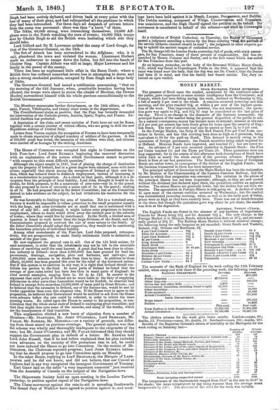The House of Commons was occupied last night in Committee
on the Irish Poor-law; Lord Jome RUSSELL beginning the renewed discussion with an explanation of the course which Government meant to pursue " with respect to this most difficult question."
Although the object sought in 1847, that of placing the charge of destitution upon the property of Ireland, had in a great degree been attained, some evils have arisen; especially that alarm among the occupiers of Ireland at their new bur- dens, which has induced them to diminish employment, instead of increasing it as a counteraction to pauperism. As a check on that panic, although it is a di- vergence from the principle of local liability, Lord John thought it would be de- sirable, for Irish purposes, to fix a maximum of poor-rate--say 5s. in the pound. He also proposed in cases of necessity a union rate of 2s. in the pound; making in all 7s. He had proposed that in the Select Committee; but as the Committee desired to take evidence on the subject, he had withdrawn his resolution for the present.
He was favourable to limiting the area of taxation. Not to a townland area, because it would be impossible to refuse protection to the small proprietor equally with the large, and some townlands are so small that one is mentioned with a rental of only 301.: and although it might induce some proprietors to increase employment, others no doubt would drive away the resident poor to the suburbs of towns ; where they would live by mendicancy. In the North, a limited area of taxation is found to work better than the large divisions of the South, and the Commissioners proposed to contract the size of some unions in the South. If the Select Committee should adopt that suggestion, they would not be sanctioning the hazardous principle of individual liability.
Among other amendments of the Poor-law, Lord John proposed, retrospec- tively, but not prospectively, to make family settlements liable to deduction on account of the poor-rate.
He now explained the general rate in aid. Out of the 131 Irish unions, 20 need assistance, in order that the inhabitants may not be left to the miserable chance of surviving until the next harvest. A great deal has been done to stimu- late industry in Ireland: more than 2,000,0001. has been granted for land im- provements, drainage, navigation, piers and harbours, and railways; and 1,000,0001. more remains to be drawn from time to time. In addition to those efforts, 50,0001. has been granted this year for the relief of the distressed Unions. But if this system is to continue in any way, it is right that Ireland should con- tribute her portion to the fund. In some parts of Ireland he found that the average of poor-rates levied has been less than in many parts of England: he cited several examples, ranging from Is. 2d. to 4s. lid. In answer to the argument that such parts of Ireland are no more liable to the duty of supplying deficiencies in other parts than Lancashire would be for Norfolk, he observed that Ireland is exempt from more than 12,000,0001. of taxes paid by Great Britain; and he believed that the extension to Ireland, say of the Income-tax, would be met by louder opposition than even this sixpenny rate. If the House were to agree to the proposition, he believed that Government would be entitled to ask from the House some advance before the rate could be collected, in order to relieve the more pressing wants. He called upon the House to assent to his proposition, in con- sideration that the whole social state of Ireland is undergoing great transition; and that they might thus save some of the miseries, and many of the deaths, which are the consequences of that transition. This explanation elicited a new burst of objection from a number of Members—Mr. STAFFORD, Mr. JOHN O'CONNELL, Lord BERNARD, Mr. FAGAN, Mr. BANKES, Mr. MoNsELL—on a variety of grounds, not differ- ing from those stated on previous evenings. The general opinion was that the scheme was wholly and thoroughly inadequate to the exigencies of the case; but Mr. Joins O'CoNNELL and Mr. FAGAN intimated that they should support the Government plan in default of a better. Mr. BANEES told Lord John Russell, that if he had before explained that his plan included more advances, on the security of this precarious rate in aid, he could not have induced the House to go into Committee. On the motion of Mr. Osnoass, the Chairman reported progress; Lord Jome RUSSELL intima- lug that he should propose to go into Committee again on Monday. In the other House, replying to Lord BROUGHAM, the Marquis of LANS- DOWNE said he did not know, and did not believe, that our Consul at Leghorn had in any way recognized the insurgent Government of Tuscany. Earl GREY laid on the table "a very important memorial" just received from the Assembly of Canada on the subject of the Navigation-laws.


























 Previous page
Previous page